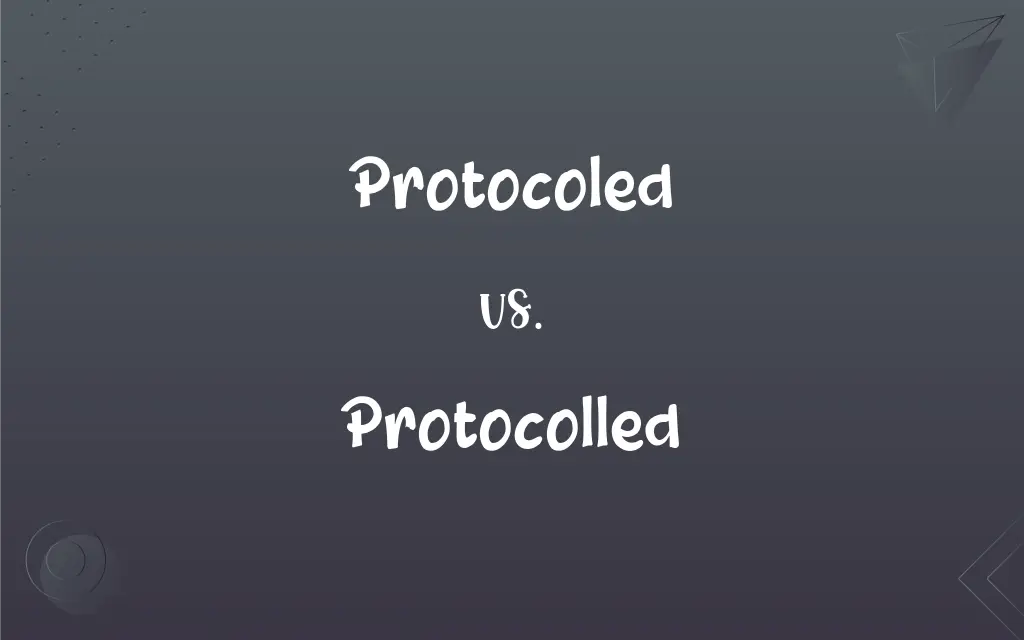Protocoled vs. Protocolled: What's the Difference?
By Aimie Carlson || Updated on May 23, 2024
"Protocoled" and "Protocolled" refer to recording or adhering to protocols, with "protocoled" being the preferred American English spelling, whereas "protocolled" is more common in British English.

Key Differences
"Protocoled" is the American English spelling for the past tense of "protocol," meaning to record or follow a protocol. In contrast, "protocolled" is the British English spelling for the same verb form.
The term "protocoled" is used in the U.S. to describe actions or procedures documented according to a protocol. "Protocolled," however, is the British counterpart, meaning the same but used primarily in the UK and other regions following British English conventions.
In written American English, "protocoled" aligns with the simplified spelling rules, reducing double letters in verbs. On the other hand, British English often retains the double consonants, hence "protocolled."
Usage of "protocoled" typically appears in American scientific, medical, or legal documentation. Conversely, "protocolled" is more frequently found in similar British documents and contexts.
"Protocoled" emphasizes American spelling conventions, aiming for simplicity and efficiency. "Protocolled," reflecting British spelling traditions, maintains a more classical approach to verb forms.
ADVERTISEMENT
Both terms are grammatically correct within their respective dialects but should be used according to the regional spelling standards to ensure clarity and adherence to language norms.
Comparison Chart
Dialect
American English
British English
Spelling Convention
Simplified
Classical
Usage Region
United States
United Kingdom
Common Context
Scientific, Medical, Legal
Scientific, Medical, Legal
ADVERTISEMENT
Consonant Doubling
No
Yes
Protocoled and Protocolled Definitions
Protocoled
Recorded in accordance with a protocol.
The research procedures were strictly protocoled.
Protocolled
Documented according to formal procedures.
The laboratory tests were protocolled.
Protocoled
Documented as per formal guidelines.
The clinical trial steps were protocoled.
Protocolled
Recorded in line with protocol guidelines.
The observations were carefully protocolled.
Protocoled
Adhered to official protocols.
The new software update was protocoled.
Protocolled
Adhered to protocol requirements.
The data collection process was protocolled.
Protocoled
Followed an established protocol.
Each step of the experiment was protocoled.
Protocolled
Noted in official documentation.
The security measures were protocolled in the report.
Protocoled
Noted in official records.
The agreement was protocoled in the meeting minutes.
Protocolled
Followed established protocols meticulously.
The research project was protocolled from start to finish.
Protocoled
The forms of ceremony and etiquette observed by diplomats and heads of state.
Protocolled
The forms of ceremony and etiquette observed by diplomats and heads of state.
Protocoled
A code of correct conduct
Safety protocols.
Academic protocol.
Protocolled
A code of correct conduct
Safety protocols.
Academic protocol.
Protocoled
The first copy of a treaty or other such document before its ratification.
Protocolled
The first copy of a treaty or other such document before its ratification.
Protocoled
A preliminary draft or record of a transaction.
Protocolled
A preliminary draft or record of a transaction.
Protocoled
The plan for a course of medical treatment or for a scientific experiment.
Protocolled
The plan for a course of medical treatment or for a scientific experiment.
Protocoled
(Computers) A standard procedure for regulating data transmission between computers.
Protocolled
(Computers) A standard procedure for regulating data transmission between computers.
Protocoled
To form or issue protocols.
Protocolled
To form or issue protocols.
Protocoled
Simple past tense and past participle of protocol
Protocolled
Simple past tense and past participle of protocol
FAQs
Is "protocoled" correct in British English?
No, "protocolled" is the correct form in British English.
Why does American English use "protocoled"?
American English often simplifies spellings by reducing double consonants.
Can "protocolled" be used in American English?
It can be understood, but "protocoled" is preferred.
Where is "protocolled" commonly used?
In British scientific, medical, and legal contexts.
Is "protocoled" a modern adaptation?
It follows modern American English spelling conventions.
Which term would appear in a British legal document?
Protocolled.
How would you use "protocolled" in a sentence?
E.g., The tests were carefully protocolled.
What is the difference between "protocoled" and "protocolled"?
"Protocoled" is American English, while "protocolled" is British English.
Where would you find the term "protocoled"?
In American scientific, medical, and legal documents.
Are both "protocoled" and "protocolled" grammatically correct?
Yes, in their respective dialects.
Which term would be used in an American medical journal?
Protocoled.
Does "protocolled" follow a pattern in British English spelling?
Yes, it often retains double consonants in verbs.
What should writers consider when choosing between "protocoled" and "protocolled"?
The intended audience and the regional spelling conventions.
Is there any difference in meaning between the two terms?
No, the meaning is the same; only the spelling differs.
Is one term more formal than the other?
No, both are formal but region-specific.
How does one remember which form to use?
Associate "protocoled" with American English and "protocolled" with British English.
How would you use "protocoled" in a sentence?
E.g., The procedures were meticulously protocoled.
Are these terms interchangeable in international contexts?
They can be understood interchangeably but should follow the regional standard.
Why is consistency important in using these terms?
To maintain clarity and adherence to regional spelling standards.
Can using the wrong term cause confusion?
Yes, especially in formal or technical writing.
About Author
Written by
Aimie CarlsonAimie Carlson, holding a master's degree in English literature, is a fervent English language enthusiast. She lends her writing talents to Difference Wiki, a prominent website that specializes in comparisons, offering readers insightful analyses that both captivate and inform.































































